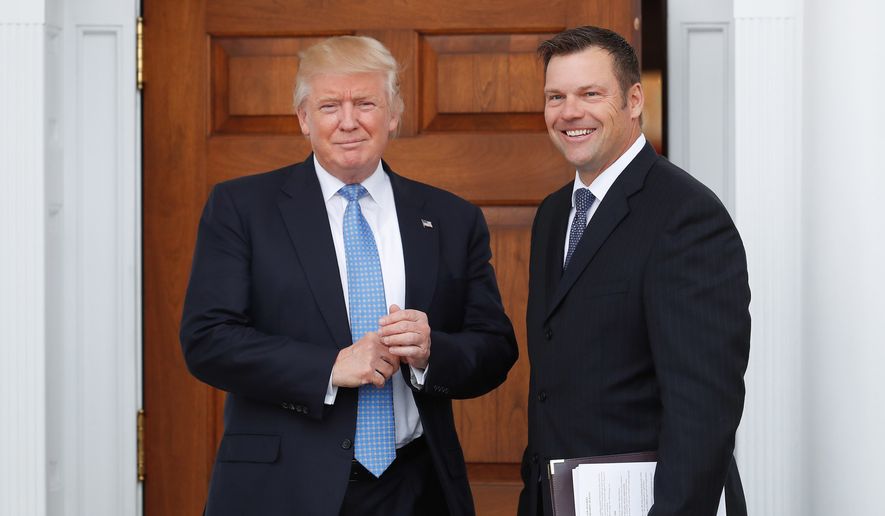President Trump established a commission Thursday to study voter fraud and suppression, tapping Vice President Mike Pence and Kansas Secretary of State Kris W. Kobach to lead an effort that is drawing fire even before its first meeting.
On an issue where anecdotes, conjecture and accusations from both sides have dominated the debate, the commission hopes to break new ground by producing a comprehensive national look at the extent of voter fraud.
The commission, for the first time, will delve into Homeland Security databases in an effort to determine the scope of noncitizens who end up illegally registered to vote — and sometimes even cast ballots.
“People have their different opinions about whether this is big enough to be considered a problem, how big a problem is it. But oftentimes they don’t have a whole lot of data to work with. This commission will provide that data,” Mr. Kobach told The Washington Times just after Mr. Trump signed an executive order creating the commission.
The idea for the commission stems from Mr. Trump’s insistence that Democratic opponent Hillary Clinton’s popular victory last year was padded by illegal votes. Liberal voting rights groups dismissed that, saying there isn’t enough evidence of fraud to give the matter attention.
The commission’s charge is broad and the wording is tempered, but Mr. Trump’s signature ignited ferocious pushback from Democrats and activist groups, who said he was setting the stage to strip voting rights from some Americans.
The ink was barely dry on the executive order before the American Civil Liberties Union said it had filed an open records request demanding that the White House release the evidence Mr. Trump is referencing when he makes claims of fraud.
Dale Ho, ACLU voting rights project director, called on sources to boycott the commission to try to prevent it from completing its work. He called Mr. Kobach “the king of voter suppression” and said his participation makes the commission “a sham.”
Rep. Luis V. Gutierrez, Illinois Democrat, called Mr. Kobach an “enemy of American democracy,” and Frank Sharry, executive director of America’s Voice, said Mr. Kobach displays bigotry in his efforts to tighten voting and immigration laws.
The Brennan Center for Justice, another of the advocacy groups, released a report last week surveying election officials in 42 cities and counties and saying that 40 of them reported “no known incidents of noncitizen voting” last year.
Mr. Kobach, though, said there are types of fraud that no local official could identify. A legal immigrant who hasn’t obtained citizenship could have registered, perhaps while at the motor vehicles bureau, and it’s unlikely local elections officials would become aware.
“To make broad statements like ’It’s not a problem, it doesn’t exist’ — that is factually impossible to do. So what the commission is going to do is provide facts,” he said.
“Their reaction is, ’Oh no, we don’t want to see facts, we don’t want to see data.’ Well, all we’re going to do is provide data to the public, and people can draw their own conclusions about the numbers,” Mr. Kobach said.
He said it will be tougher to gauge voter suppression, which Democrats say is a bigger problem in elections than fraud.
Mr. Kobach said nonvoting is often the result of several factors and pinning down the one that discourages a person from casting a ballot is tough.
“We’ll see what the commission is able to do, and other people on the commission and people that bring evidence before the commission may bring things that I haven’t anticipated,” he said. “That’s one that’s a really tough nut to crack because it’s hard to say 100 percent that you voted in that election because of these reasons, or you didn’t vote because of that reason.”
He said Kansas has not seen evidence that its photo ID requirement is dissuading voters but other states might have evidence.
Although academics and voting officials have studied voter fraud for years, Mr. Kobach said, they have never been able to take a comprehensive look because they have not had access to important data.
He said the commission will be able to use Homeland Security data that lists every legal immigrant and visa holder in the country — and will run a sample of state voter files against that data to try to spot noncitizens who are registered to vote.
Mr. Kobach said the commission also may tap Social Security’s Death Master File to see how often dead people show up on local voting rolls.
Conservative groups said there are hints of how bad the fraud problem is.
North Carolina’s Board of Elections has identified 41 noncitizens who voted in its election last year, and Nevada has an active investigation. The Washington Times has asked for documents on that probe, but Nevada has delayed its answers.
“Perennial questions surrounding the actual scope of ineligible voters and their rates of participation can only be answered when federal offices share information,” said Logan Churchwell, spokesman for the Public Interest Legal Foundation.
In addition to Mr. Pence and Mr. Kobach, four current or former secretaries of state have been appointed: Democrats from New Hampshire and Maine, and Republicans from Indiana and Ohio.
The commission also will have one of the members of the U.S. Election Assistance Commission. A half-dozen other members are still to be named, though Mr. Kobach said the endeavor will be bipartisan.
“I’m keeping an open mind, and I think all members of the commission will have an open mind. The charge of the commission is to go out and collect the facts and go where the facts lead us,” he said.
• Dave Boyer can be reached at dboyer@washingtontimes.com.
• Stephen Dinan can be reached at sdinan@washingtontimes.com.




Please read our comment policy before commenting.